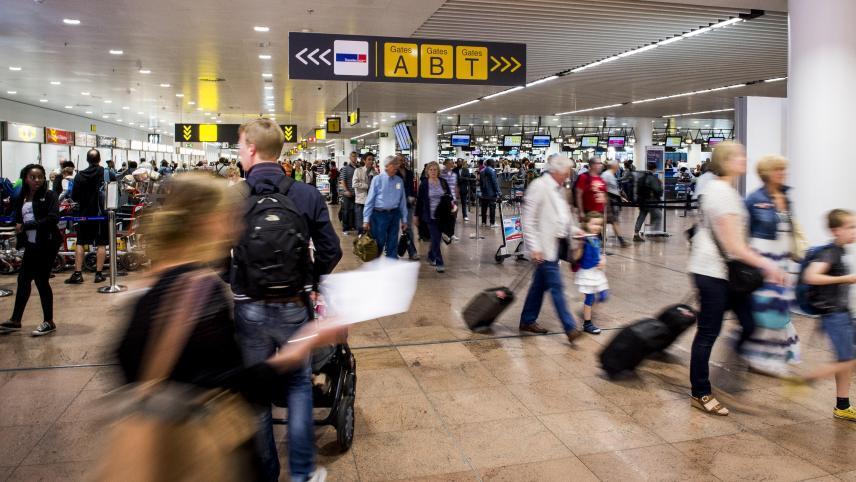While a month ago, it seemed likely that people could travel without too many restrictions during next week's autumn holidays, a fourth wave of coronavirus infections threw a spanner in the works for travellers across Europe.
Just like in Belgium, the obligation to wear a face mask in crowded places and a version of the Covid Safe Ticket (CST) will be the rule rather than the exception in most countries during the week-long autumn break, which officially starts on Monday 1 November.
The Netherlands
Similar to the Belgian situation, the Dutch coronavirus figures are on the rise again as well, as the number of positive tests in the country has more than doubled in just two weeks, with a total of 38,733 positive tests over the past week.
Since 25 September, the Dutch authorities require a "corona admission ticket" similar to Belgium's CST to gain access to the indoor parts of restaurants and bars, sports competitions, cinemas and at events.
Face masks, however, are only mandatory on public transport and in aeroplanes. Healthcare institutions can decide for themselves whether or not they require a mask from visitors.
France
While the country still had some green zones on the European Centre for Disease Prevention and Control (ECDC)'s travel map last week, the country has now turned entirely orange, indicating that the situation is also worsening slightly.
Last summer, the French authorities introduced the 'pass sanitaire' (health pass) for the hospitality industry, leisure and cultural places (like museums), certain large shopping centres, healthcare institutions and for travel by plane, or for long journeys by train and bus.
Face masks are mandatory on all public transport and in most indoor areas.
Additionally, there is also a capacity limitation in many places: for example, no more than 1,000 people may gather at an event
Italy
While the situation in Italy is still generally stable, a few of its previous green zones have turned back to orange, indicating that the number of infections in some regions is also increasing slightly.
Italy was one of the first countries to introduce its 'certificazione verde' (green certificate) to participate in public life. Currently, the pass is still compulsory for museums, the indoor parts of hospitality establishments, amusement parks and other places where large numbers of people congregate.
Since mid-October, the country has also gone one step further: all employees and civil servants must be able to present a green certificate, making vaccination virtually obligatory for everyone in Italy.
Additionally, wearing a face mask is compulsory on public transport and in indoor public places.
The United Kingdom
Since this summer, the figures in the UK have started to rise again, but they seem to have stabilised at a high level at the moment. However, a few measures are currently still in place.
Since the end of September, a Covid pass has been compulsory in Wales and Scotland in various places, such as the hospitality industry and events.
For the time being, England is holding off but it also developed a 'plan B' to get through the winter: if that plan is activated, the pass will also be introduced in England.
The government recommends face masks in crowded places, but it is not an obligation. However, operators can choose to make them mandatory, which is the case on the London underground metro system, for example.
Related News
- Pandemic law, back to face masks: these rules change
- Mandatory from Monday: the new rules for Belgium's Covid Safe Ticket
- Brussels and Wallonia once again dark red on European travel map
Germany
While the figures are on the rise in most of the country, Germany does not take the coronavirus measure at the federal, but at the regional level.
Most regions require a Covid pass in the hospitality sector, but it is not compulsory everywhere. In certain regions, businesses, shops and restaurants are even allowed to refuse non-vaccinated people at the door.
In many places, wearing a face mask is mandatory, and some regions even require a FFP2 mask. Apart from face masks and the Covid pass, the consumption of alcohol is also prohibited in public places in several federal states.
To find out which measures apply in each region, click here.
Austria
Since the beginning of June, the figures have been on the rise, which has seen Austria mainly targeting the non-vaccinated.
A Covid pass is compulsory at many locations, such as hotels, restaurants, theatres, but also beauty salons and fitness centres.
From the moment that a quarter of the total ICU capacity is occupied, stricter rules will apply: only vaccinated people or citizens with a recovery certificate will be allowed to visit the hospitality industry. If that does not result in improved figures, there will even be a lockdown for vaccine refusers. Only in exceptional cases will they be allowed on the street.
An FFP2 mask is mandatory on public transport, in supermarkets, the post office and the town hall.
Greece
Over the past months, the figures in Greece have gone up and down frequently, but they are currently rising rapidly again.
The government recently introduced a Covid pass in the hospitality sector, among other sectors, which will be mandatory until at least March 2022. In places where the pass is in force, no other restrictions apply.
Face masks are compulsory in almost all publicly-accessible indoor areas.
Spain
After Spain turned almost entirely dark red on the ECDC map before the summer, the figures have been falling consistently since mid-August, and now seem to be well under control as half of the country is a green zone.
The Spanish authorities have not (yet) introduced a Covid pass, but the obligation to wear a face mask applies in all indoor spaces.
Additionally, several regions have also reduced the maximum number of people allowed in restaurants, nightclubs or event venues.

